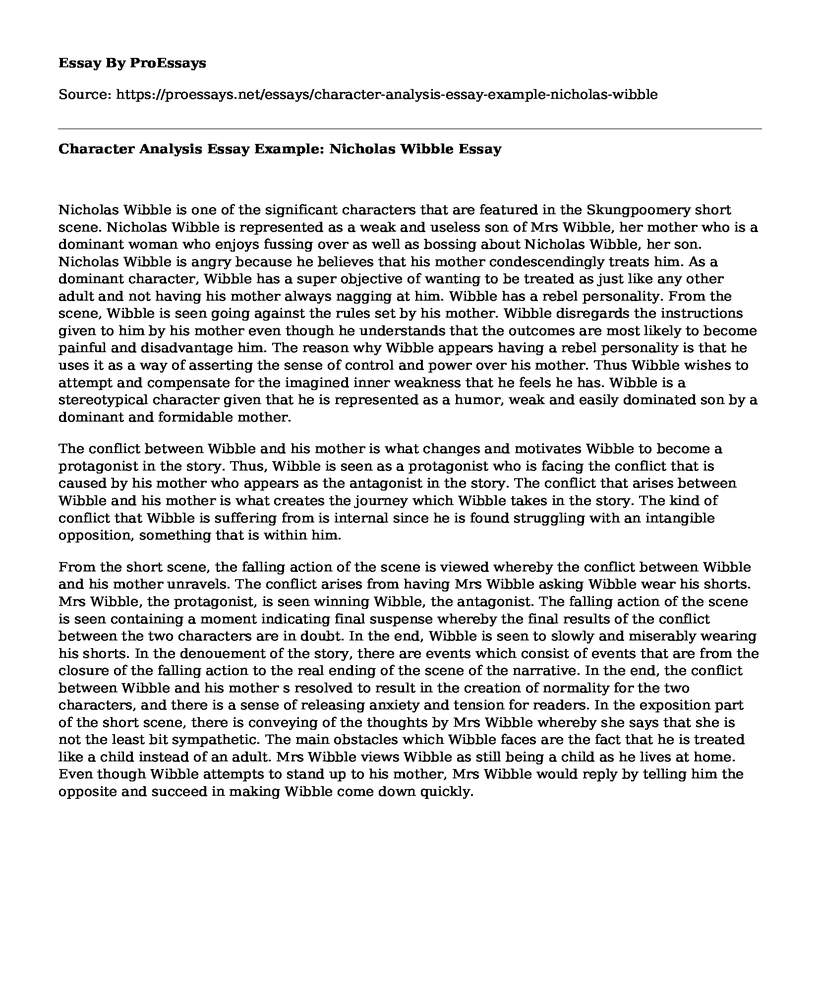Nicholas Wibble is one of the significant characters that are featured in the Skungpoomery short scene. Nicholas Wibble is represented as a weak and useless son of Mrs Wibble, her mother who is a dominant woman who enjoys fussing over as well as bossing about Nicholas Wibble, her son. Nicholas Wibble is angry because he believes that his mother condescendingly treats him. As a dominant character, Wibble has a super objective of wanting to be treated as just like any other adult and not having his mother always nagging at him. Wibble has a rebel personality. From the scene, Wibble is seen going against the rules set by his mother. Wibble disregards the instructions given to him by his mother even though he understands that the outcomes are most likely to become painful and disadvantage him. The reason why Wibble appears having a rebel personality is that he uses it as a way of asserting the sense of control and power over his mother. Thus Wibble wishes to attempt and compensate for the imagined inner weakness that he feels he has. Wibble is a stereotypical character given that he is represented as a humor, weak and easily dominated son by a dominant and formidable mother.
The conflict between Wibble and his mother is what changes and motivates Wibble to become a protagonist in the story. Thus, Wibble is seen as a protagonist who is facing the conflict that is caused by his mother who appears as the antagonist in the story. The conflict that arises between Wibble and his mother is what creates the journey which Wibble takes in the story. The kind of conflict that Wibble is suffering from is internal since he is found struggling with an intangible opposition, something that is within him.
From the short scene, the falling action of the scene is viewed whereby the conflict between Wibble and his mother unravels. The conflict arises from having Mrs Wibble asking Wibble wear his shorts. Mrs Wibble, the protagonist, is seen winning Wibble, the antagonist. The falling action of the scene is seen containing a moment indicating final suspense whereby the final results of the conflict between the two characters are in doubt. In the end, Wibble is seen to slowly and miserably wearing his shorts. In the denouement of the story, there are events which consist of events that are from the closure of the falling action to the real ending of the scene of the narrative. In the end, the conflict between Wibble and his mother s resolved to result in the creation of normality for the two characters, and there is a sense of releasing anxiety and tension for readers. In the exposition part of the short scene, there is conveying of the thoughts by Mrs Wibble whereby she says that she is not the least bit sympathetic. The main obstacles which Wibble faces are the fact that he is treated like a child instead of an adult. Mrs Wibble views Wibble as still being a child as he lives at home. Even though Wibble attempts to stand up to his mother, Mrs Wibble would reply by telling him the opposite and succeed in making Wibble come down quickly.
Cite this page
Character Analysis Essay Example: Nicholas Wibble. (2022, Dec 06). Retrieved from https://proessays.net/essays/character-analysis-essay-example-nicholas-wibble
If you are the original author of this essay and no longer wish to have it published on the ProEssays website, please click below to request its removal:
- The Outsider
- Critical Essay on Poetry of Walt Whitman and Emily Dickinson
- Intertextuality in J. Fowles' "The French Lieutenant's Woman"
- Literary Analysis Essay on "Two Words" and "A Very Old Man with Enormous Wings" by Isabel Allende
- Assignment Example on Death of a Salesman by Arthur Miller
- Divine Intervention: Athena's Protection of Odysseus in Homer's Odyssey - Essay Sample
- Assignment Example on German Romanticism







